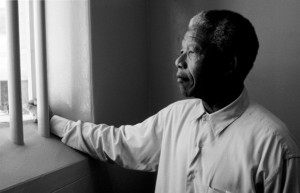 There is no need to add to the chorus of praise for Nelson Mandela. He deserves it all. I wonder, though, if some of the fervent singing is due not to who Mandela was, but to a sudden fear that the breed of politicians who rise to the rank of great statesmen has passed with him.
There is no need to add to the chorus of praise for Nelson Mandela. He deserves it all. I wonder, though, if some of the fervent singing is due not to who Mandela was, but to a sudden fear that the breed of politicians who rise to the rank of great statesmen has passed with him.
Mandela by his own insistence was not a saint. None of us are, of course, but his acknowledgment seemed a deliberate attempt to discourage a personality cult. While that puts him all the closer to sainthood, I’ll honor his self-assessment and merely accuse him of humility and wisdom.
Sadly, however, he undermined his claimed unsaintliness by refusing to serve more than one term as president. Perhaps he was just old enough to know better at that point, but even that would amount to uncommon wisdom. Not uncommon for an average person, but tragically uncommon for a politician.
It is that distinction, between common people and politicians, that grabs hold of me when I think of Mandela and his legacy. Without in any way detracting from his achievements, it is worth reflecting on the fact that Mandela knew firsthand what he was fighting for. Naturally he knew the oppression that black South Africans faced, and his 27 years as a political prisoner gave him intimate knowledge of the demoralizing reality of incarceration. But he also knew poverty, and life far from the conveniences of the comfortable, the life of most of his fellow South Africans.
I don’t think any US presidents or senators of the last few decades grew up poor and oppressed. Maybe I’m wrong. And I don’t think many Supreme Court justices or, for that matter, congressional representatives (statistically speaking) fall into that category either. I think the United States is being and has long been run by fairly well-off people.
It is easy enough to make the case that democracy in this country is dysfunctional at best, having been replaced by an oligarchy with the means and resources to manipulate public opinion almost at will. But I don’t think we need to debate that, because a more basic dysfunction is at work.
How many of our leaders who decide how lazy poor people are and how much and what type of assistance they should get have ever gone hungry? Or had to rely on outside assistance to get by? How many of the leaders who have presided over the increase of the US prison population to the highest per capita in the developed world have spent time locked inside a cell?
No, I am not trying to make the case that only poor people and criminals can run the country. But I am suggesting that maybe people who have no understanding of poverty and social oppression cannot run the country well. And I don’t think one needs to bankrupt oneself or go to jail to gain this understanding. Compassion is what is needed.
Mandela was compassionate. Like many other great figures in history, he did not seek revenge against his oppressors. He knew that he was fighting oppression, not for the right to oppress. He knew that suffering was something that should end, not be passed on, and he went with the idea of truth and reconciliation rather than revenge.
Suffering makes it easier to be compassionate. Actually, they are interchangeable, because compassion literally means to feel others’ suffering, just as it means to feel their joy. All it takes is not separating the world into me (or us) and them.
Since there really is very little chance of anyone with a background similar to Nelson Mandela’s coming to lead the United States out of what looks ever more like a form of social apartheid, what would it take for someone to attain a similar stature as a great statesman? The spokesperson for an era?
In the US context it would mean making the poor first-class citizens, on a par with the rich but without demeaning anyone. It would mean protecting the rights of ordinary people from being trampled by the legal might of corporations with their vast resources, while protecting the legitimate rights of businesses. It would mean treating everyone with respect and inviting them to do the same, and to be willing to sacrifice some of what they have and some of what they are sure of so that we can create something better than what we have, in ways that we might not think would work.
Nelson Mandela was a great man, and a politician insofar as he needed to be one, but he answered the need for greatness in a particular time and place. Greatness is also needed for our time and place. It will not be Mandela who answers the call, but it will be someone or some ones who know poverty and social oppression intimately — either because they have lived through them or because they feel them just the same.
Here! Here! Mandela will be truly missed. For an interesting contrast, look at Teddy Roosevelt in Kearn’s The Bully Pulpit as he attempted to correct the corrupt powers of early 20th century America. Seems remarkably similar to the greediness of America today.